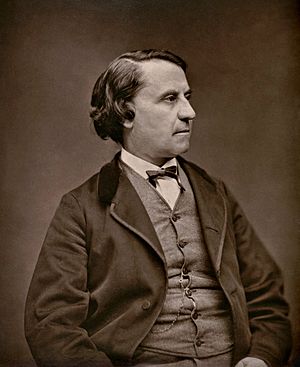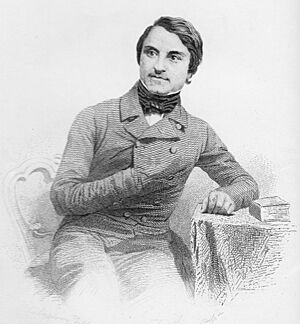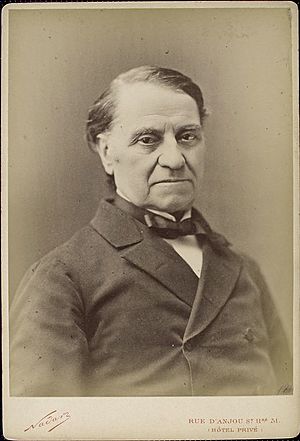Louis Blanc facts for kids
Quick facts for kids
Louis Blanc
|
|
|---|---|
 |
|
| Born | 29 October 1811 |
| Died | 6 December 1882 (aged 71) |
| Era | 19th-century philosophy |
| Region | Western philosophy |
| School | Socialism |
|
Main interests
|
Politics, history, economy |
|
Notable ideas
|
Right to work, national workshops |
|
Influenced
|
|
Louis Jean Joseph Charles Blanc (born October 29, 1811 – died December 6, 1882) was an important French politician, historian, and socialist thinker. He believed in helping poor city workers find jobs. He suggested creating special groups called cooperatives. These would be like businesses where workers owned and ran things together. They would share the profits fairly.
Blanc wanted the government to help these cooperatives get started. He hoped they would eventually replace regular businesses. Even though his ideas for worker cooperatives were not fully put into action, his thoughts greatly shaped the idea of socialism in France.
After the French Revolution of 1848, Blanc joined the temporary government. He pushed for his cooperative ideas. He wanted the government to support these groups at first. Then, the workers themselves would take full control. However, his plans did not work out. He was caught between angry workers and the government's army. Because of this, he had to leave France and live in exile.
Blanc came back to France in 1870, just before the end of the Franco-Prussian War. He became a member of the French National Assembly. He did not support the Paris Commune, which was a radical government in Paris. But he successfully suggested that people involved in the Commune should be forgiven.
Contents
Biography
Early Life and Ideas
Louis Blanc was born in Madrid, Spain. His father worked for the French government. Louis also had a younger brother, Charles Blanc, who became a famous art critic.
Louis Blanc studied law in Paris. He lived in poverty and started writing for different newspapers. In 1839, he started his own newspaper, Revue du progres. Here, he published his famous essay, L'Organisation du travail (The Organization of Work).
In this essay, Blanc explained his main ideas. He believed that competition in society caused many problems. He thought it hurt weaker people. He wanted everyone to earn similar wages. He also believed that people's personal goals should join with the common good. He famously said, "from each according to his ability, to each according to his needs."
To make this happen, he suggested "social workshops." These were like a mix of a cooperative and a workers' union. In these workshops, people in the same job would work together for their shared benefit. In 1841, he wrote Histoire de dix ans 1830-1840. This book criticized the French monarchy at the time.
The Revolution of 1848
In 1847, Blanc began publishing his Histoire de la Revolution Française. But the French Revolution of 1848 interrupted his work. During this revolution, he became part of the temporary government.
Blanc suggested that the government should promise jobs to workers. He also wanted a special government department for labor. This idea was not fully accepted. But he was put in charge of a government group called the Commission du Gouvernement pour les travailleurs. This group looked into worker issues.
The 1848 revolution was a big chance for Blanc's ideas. He believed that the government could help make big changes. He thought workers could control their own lives. But they needed help to start their cooperative workshops. Blanc pushed for government money to fund these workshops. He believed the workers would take over once they were stable. He even suggested using money from the railway system to pay for these projects.
However, when the government started the "workshop program," Blanc's rival, Émile Thomas, was put in charge. The government was not fully ready for such a big social program. They used the workshops to buy time and calm down angry workers. Thomas did not organize the workshops well. This made the public even angrier. People had been promised good jobs and worker-controlled environments. Instead, they got low-paying manual labor or were paid to do nothing.
When the workshops closed, workers rebelled again. But the government's National Guard stopped them by force. The government also blamed Blanc for the workshops' failure. His ideas were questioned, and he lost much of his public support.
Blanc was almost killed during this time. He escaped to Belgium and then to London using a fake passport. A special court in France sentenced him to be sent away from the country. He wrote articles protesting this decision.
Years in Exile
While in Britain, Louis Blanc used the British Museum to finish his large book, Histoire de la Revolution Française. It was 12 volumes long and published between 1847 and 1862. He also wrote a book about the 1848 revolution called Histoire de la révolution de 1848. He was also involved in a masonic group.
Return to France
Louis Blanc had always been against a return to a powerful ruler like Napoleon. He called it "despotism without glory." So, he stayed in exile until the Second French Empire ended in 1870.
He then returned to Paris and joined the National Guard as a private. In 1871, he was elected to the French National Assembly. He believed that a republic was the best form of government. He voted to continue the war. Even though he was a leftist, he did not agree with the Paris Commune. He tried to encourage calm and moderation.
In 1878, he suggested getting rid of the presidency and the Senate. In 1879, he proposed that the people involved in the Paris Commune should be forgiven. This idea was passed. This was his last important act.
His later years were difficult due to poor health and the death of his wife in 1876. He died in Cannes and received a state funeral in Père Lachaise Cemetery.
His Impact
Louis Blanc was a skilled writer and speaker. He had a strong way of expressing his beliefs. His political and social ideas greatly influenced the growth of socialism in France.
Some of his other important books include Lettres sur l'Angleterre (Letters on England) and Questions d'aujourd'hui et de demain (Questions of Today and Tomorrow). The Paris Métro station Louis Blanc is named after him.
What is Capitalism?
Louis Blanc is sometimes said to be one of the first people to use the word "capitalism" in a way similar to how we use it today.
His Ideas
Changing Society Peacefully
Blanc was unique because he supported socialism without needing a violent revolution first. He believed in making changes through the existing government.
The Right to Work
Blanc came up with the idea of the "right to work" in his book Le Droit au Travail. This idea means that everyone should have the right to a job.
Religion and Society
Blanc believed that religion was important for big changes to happen in society. He thought that liberalism and Protestantism were part of the same historical movement. He saw the French Revolution as a political result of people rejecting authority, similar to how Protestants rejected some church authority.
Blanc thought the best part of the French Revolution was the Jacobin period. He saw it as having a strong community spirit, like Catholicism. Blanc himself tried to combine ideas from Catholicism and Protestantism. He wanted to bring together the values of authority, community, and individual freedom. He was unusual for combining Catholic ideas with socialism.
Along with another thinker named Etienne Cabet, Blanc supported what he saw as true Christianity. He also criticized some Catholic clergy. He was hopeful about new religious ideas during the early French Revolution. His belief in God was shaped by romanticism and was similar to the ideas of Jean-Jacques Rousseau.
Works
- L'Organization du Travail (1839) (The Organization of Work)
- Histoire de Dix Ans, 1830-1840 (1841) (The History of Ten Years, 1830-1840)
- Histoire de la Revolution Francaise (1847-1862) (The History of the French Revolution)
- Lettres sur L'Angleterre (1865) (Letters on England)
See also
 In Spanish: Louis Blanc para niños
In Spanish: Louis Blanc para niños
- French demonstration of 15 May 1848
 | Valerie Thomas |
 | Frederick McKinley Jones |
 | George Edward Alcorn Jr. |
 | Thomas Mensah |



